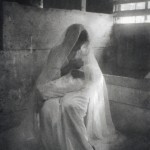
This is incarnation season. This is the time we remember that God lived in a womb, floating in amniotic fluid, fed through an umbilical cord. Christ would have been kicking about now; a look at Mary’s swollen stomach would have revealed the flutter of the Messiah inside. He could see at this point, the glow world of light through skin, punctuated by subcutaneous blood vessels. The voices were familiar, his mother singing her subversive songs, his father caring for this illegitimate Messiah to come. Joseph’s shop close at hand, the utero Jesus would have known the sound of iron nails driven in hard wood.
This is incarnation season and we have a problem with it. We don’t want our God so near as this. We are worried that if God became human we will have to become human too. We are worried that if God became incarnate we will have to be incarnate, taking on skin and flesh, living in our bodies. We want a divine, spiritual God who will usher us from our bodily life into some ethereal reality. Try other doors for that than Christianity. Christianity is a faith that centers on a God who became embodied and remains in the flesh, a God who died and returned with skin that bares scars.
But we have a problem with such a God because we have a problem with our own bodies. We don’t want to live lives bound by skin, limited by blood and the exchange of oxygen. We long for cyberspace, unbound desire that never comes crashing into hunger or hurt or exhaustion. Some of our religious teachers comfort us with promises of a spiritual heaven, a far away hope away from this earth of dirt and these bodies that live from and toward the soil. On the other side the message from the grocery store magazine rack offers another kind of denial of our flesh. The covers would have us think that we will never be happy in our skin unless we achieve some airbrushed six-pack, the impossible proportions of our pornographic imaginings. This too is a denial of the flesh because flesh is more messy and glorious than all that. The magazine model is as much a spiritualized figment of imagination as some harp-strumming angel.
So lets take this season of Advent, this season in which we await God made human, as a time to become incarnate, to take on flesh and be embodied. Let this be a season to run hard and feel the burn in our lungs of the winter wind. Let this be a season to embrace bodies and hold hands in prayer. Let this be a time to taste with tongues in the electric pulse of nerves, see with eyes the physical stuff of photons that are the light of the world, listen through the vibrations of air and ear to voice and sound. Let this be a time when we fill stomachs that burn with hunger; a time when we comfort bodies that live in exhaustion and pain.
This is incarnation season. Let us become incarnate so that we too made be made human once again.
Ragan Sutterfield is a writer and Episcopal seminarian sojourning from his native Arkansas in Alexandria, Virginia. He is the author of Cultivating Reality: How the Soil Might Save Us, Farming as a Spiritual Discipline and a contributor to the book Sacred Acts: How churches are working to protect the Earth’s climate. He blogs at Word + Flesh here.











